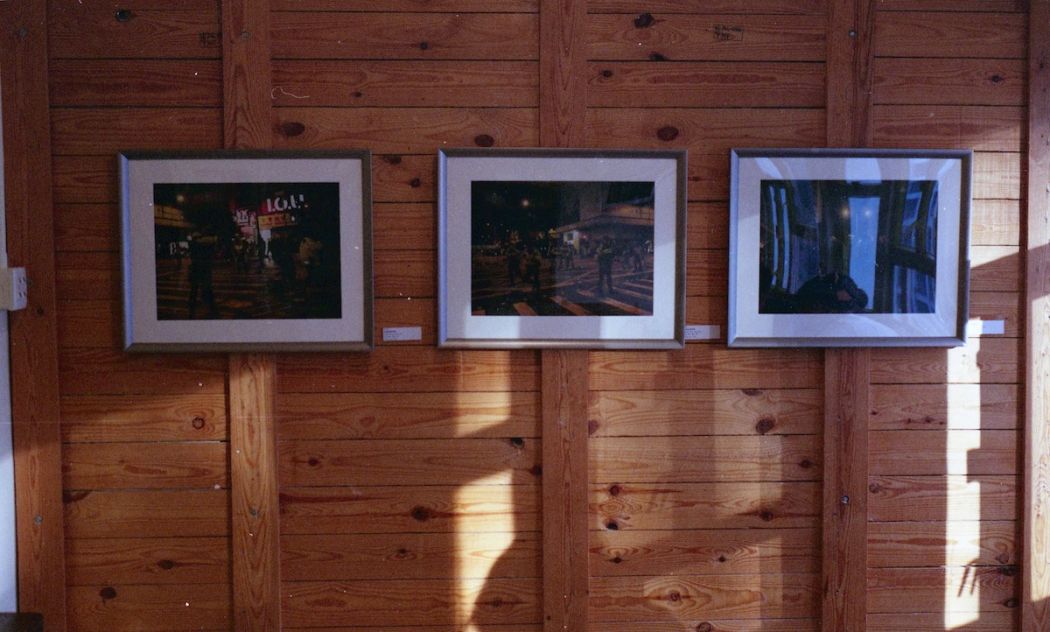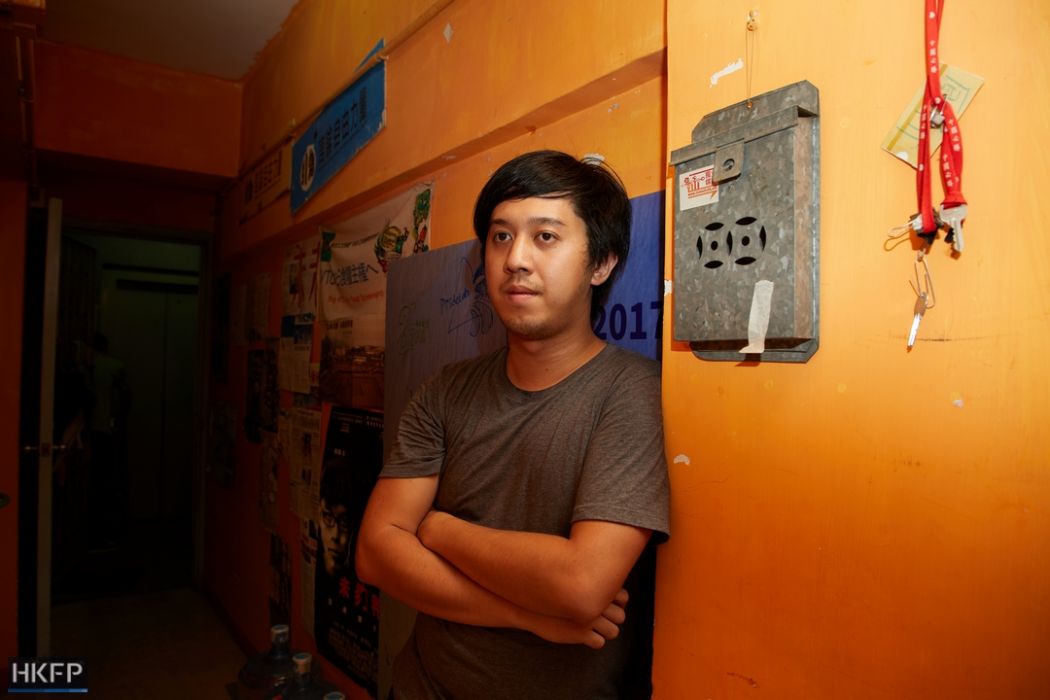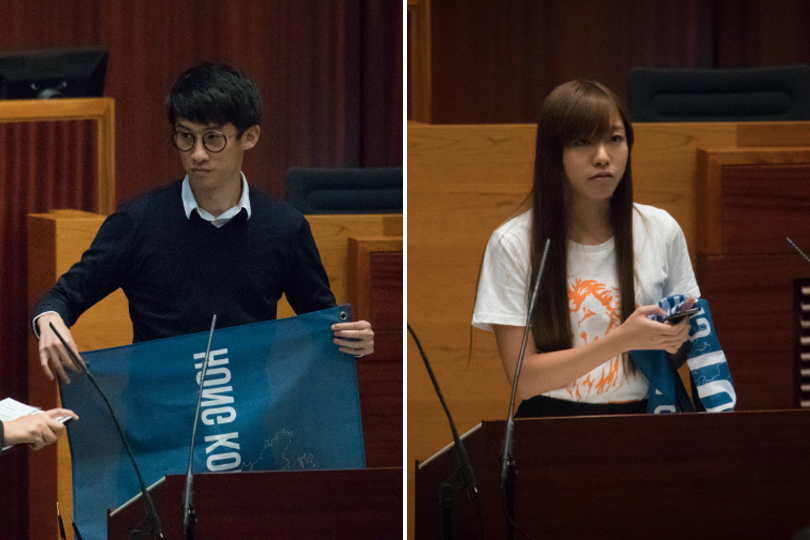Hanging on the wood-panelled walls of Art and Culture Outreach – where the afternoon sun has illuminated the bookstore and event space – are grainy photographs depicting a series of ominous scenes: a police officer pointing a gun in the dark of the night, a sea of helmets and shields, and localist Edward Leung’s solemn face marred by shadows, smoking a cigarette.
The photos were taken on the night of the Mong Kok unrest — or “fishball revolution” — in February 2016. It is a holiday tradition for Hongkongers to enjoy snacks ranging from grilled meat on skewers to fishballs from vendors over Chinese New Year, when most restaurants are closed. So when the authorities attempted to remove the street hawkers, chaos ensued.

Behind the camera that night was Wong Kai-chun, who prefers to go by Kaiser. He first entered the public eye in 2012 as one of three Scholarism members who took part in a hunger strike to protest against the proposed national education curriculum. In 2014, he was assaulted during the clearance of the Umbrella Movement’s Mong Kok site, and a photo of him with his hand covered in blood from a head wound was published in Ming Pao.
Now, Kaiser is a photographer setting out to “take Hong Kong’s funeral portrait.” Having first picked up a camera over a decade ago, Kaiser is deeply influenced by Roland Barthes’ theories on photography and death, and how the medium documents that which is about to disappear with the click of the shutter.

Kaiser’s subject is this city: the colonial-era ferry piers torn down in the name of modernisation, the old neighbourhoods transformed under “revitalisation” policies, and the ever-changing political landscape. He and fellow photographer Daniel Cheung — whose photos are also on view at the exhibition — have set up a “post-90s” photography collective to record these transformations, and published a book of their works.
“I’m capturing the warmth that is slowly draining from the activists,” he said, referring to their passion and idealism.

To call it a funeral is to lose hope. The past couple of years — from failed social movements to legislature disqualifications and imprisonments of activists — left the younger generation deeply depressed about Hong Kong: they feel like their hands are tied when it comes to Hong Kong’s political future. Kaiser compares the city to a lover whose slow deterioration and eventual death one has to watch helplessly, unable to do anything — a reference to comments by Japanese photographer Nobuyoshi Araki.
But when it came to his work, the Chinese University of Hong Kong arts student was careful to erase traces of himself and his emotions so as to present the pictures in their purest, truest form. The only captions next to the framed photographs are the locations and timestamps of the events; the rest is left to the viewer’s imagination and interpretation. “I don’t want to impose a certain biased perspective. This is what I saw; take away what you will from it,” he told HKFP.
He vividly recalls staying on the frontlines throughout the night of the Mong Kok unrest to get the best shots, sticking close to the journalists to avoid arrest, and feeling terrified when the police warning shots rang out. “If the police had not been provocative, the incident would not have escalated this quickly… it takes two to tango,” he said.
In his photos, we see both the police and protesters engaged in acts of violence. When he attended Leung’s rioting trial, however, the court saw the responsibility as lying squarely with the protesters, he said.
“There are no facts, only interpretations,” he said, quoting nihilist philosopher Friedrich Nietzsche. “I’m struggling to interpret the events too… I can only bring it back to its original state.”

Kaiser’s insistence on art that is truthful is not limited to the medium of photography: he believes that if a film is too emotional and carries a hidden agenda, it becomes propaganda. He has carried this ethos to his other project with Cheung in producing a documentary featuring Edward Leung and fellow localist Yau Wai-ching, with Kaiser shadowing the latter.
The film’s title — “Chronicle of a Summer” — is a reference to the 1960 French documentary of the same name, an influential work in cinema verite, a film movement which emphasises “truthful” cinema. The documentary features Leung and Yau between the months of April and September 2016, and is — according to Kaiser — meant to be viewed as an extension of the Mong Kok unrest.
We see Yau dressed in a white-and-orange Youngspiration t-shirt, campaigning for votes on the streets, eating satay beef noodles at a cha chaan teng, and discussing politics on the MTR. Meanwhile, Leung attends a conference in Dharamsala, India as a representative from Hong Kong at the invitation of Dalai Lama; in a memorable scene, he is seen in a heated debate with fellow conference guest, Hong Kong Alliance’s Chow Hang-tung, on the topic of nationalism.

Much of the documentary takes on a lighthearted tone: Yau jokingly threatens to beat up anyone who suggests she may turn out like Democratic Party veteran Emily Lau, while Leung takes charge of the camera to film the filmmaker while they were drunk at 4am in Dharmasala.
When Leung returned to Hong Kong, he was barred from running in the Legislative Council elections despite distancing himself from his pro-independence stance, abruptly bringing his section in the documentary to an end. That summer concluded with Youngspiration’s Yau and Baggio Leung elected as lawmakers, making them, along with Civic Passion’s Cheng Chung-tai, the first localists to gain a seat in the legislature.
But subsequent developments not captured in the film took a much darker turn. After Youngspiration’s triumph in September 2016, the pair were unseated a month later over an episode dubbed “oath-gate” — when they used what was regarded as a derogatory term to describe Chinese people during the swearing-in ceremony, prompting backlash. It triggered a legal interpretation by China’s top legislature, which saw them disqualified as lawmakers before the end of the year.

Kaiser recently reached out to the pair and asked them to reflect on the past two years as an epilogue to the film. Yau explained her actions — which many had dismissed as childish — during the oath-taking: “When the government enacts policies that the public disagrees with, they are unable to resist and must depend on you [the legislator]. If you are afraid of the government, how could people rely on you?”
The avalanche that was triggered, however, has its consequences; Yau and Leung were shunned by many who had been their supporters. “My mental state has not been great during this period of time,” Yau told Kaiser. “This is because some of my friends who assisted me during the elections felt that I no longer care about politics… they think I’ve changed.”
“I maxed out with regards to my trust towards other people these past three years,” Baggio Leung added. “Because politics is really dark – that’s the reality.”

Yau and Leung were recently handed four-week jail sentences for taking part in an “unlawful assembly” after they attempted to storm the Legislative Council in October 2016, despite having been kicked out. Even as a bystander, Kaiser found it difficult to suppress his emotions in the face of these developments.
“It was like a dream… witnessing the momentum and support they had back then, and watching them be relegated to the ranks of prisoners,” he said.
The localist movement in Hong Kong can be traced back to the early 2010s, when Chin Wan’s Hong Kong City-State triggered the first discussions of contemporary localist ideology in 2011. As Hongkongers’ frustration towards Chinese “parallel traders” in New Territories grew and the government’s national education proposals sparked fears of “brainwashing” amongst students, many began to call for the recognition of Hong Kong as having a separate culture and identity from mainland China.
After the Umbrella Movement, the ideology rose in popularity among young people, who reject cultural ties to mainland China and increasingly see peaceful processions as a “useless” method, seeking more confrontational ways of changing the system. In February 2016, Edward Leung won over 66,000 votes in a legislative by-election, a sign of how the movement has grown rapidly in just half a decade.
But the government moved quickly to clamp down on the “radical” activists, banning them from running in elections and curbing discussions of independence on Hong Kong campuses.

In early June, the same week the exhibition was held and a rough cut of the film screened for the first time, Yau was in prison serving her four-week term and Edward Leung — the poster boy of the localist movement — had just received a six-year sentence for “rioting” on the night of the Mong Kok unrest. The future survival of localism is shrouded in uncertainty, and many activists began to lose hope.
Kaiser, who has been privy to a behind-the-scenes look at the movement, refused to give a straight answer as to whether he identified as a localist, going as far as saying that localism has never been clearly defined.
From a philosophical point of view, he said, “no set of ideology is perfect,” and he preferred to judge each issue on its own merits rather than assume a stance based on beliefs. “I don’t want to buy into a package.”
For localism to recover, Kaiser said, it has to go back to the basics: it needs a logical theory as the basis, and not just a state of agitation. Kaiser recounted how localism was born out of a disdain for the pro-democracy camp, which young people saw as increasingly conservative and willing to compromise in order to stay in power. Localist parties, which grew popular after the Umbrella Movement, then presented themselves as the more radical alternative.

“A lot of the times localism is about dismantling the ‘main stage’, doing away with the way things are done in the past,” he said, adding that localists rebelled against the Hong Kong Federation of Students after the Umbrella Movement for what was perceived as their poor leadership then, and against the Tiananmen Massacre commemoration for its “patriotic” overtones.
“If you take it apart, you need to build something new in its place… but these days all we say is that people are depressed and they grow apathetic towards politics,” he said. “No one really addressed the problem of what happens after destroying the status quo… Now most of my friends in the circle are like, let’s just go to work tomorrow. Don’t bother me.”
Kaiser took a different approach: he channelled his emotions into his art in an attempt to convert his depressed emotions into something positive. It was not a cathartic experience, he said, because he knew it would not fetch any results: “The photo exhibition can’t change anything, certainly not their jail sentences or even the views of the general public.”
But he did it anyway. Kaiser could not resist quoting Nietzsche again: “‘To live is to suffer, to survive is to find some meaning in the suffering’.”
